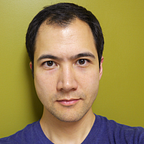You are not your tools
Look around at bios on social media sites and you’ll find that a lot of folks, often but not always early in their careers, will describe themselves by the tools they use. One area I see this a lot with is software engineers, especially those working in exciting communities. “Rubyist,” “Gopher,” and “Pythonista” are particularly pointed identifications, but there are plenty of folks who describe themselves as “Javascript Developer” or “Lover of Scala.”
It’s wonderful to learn as much as you can about your tools and to get excited about the community around them, but there’s a danger in identifying too strongly with one technology, tool, or even one community. I’m a few years into my career as an engineer and many more years into my time coding in general. I started with BASIC on an Apple IIe, moved to Pascal and C in high school, went to C++, ML, Scheme, Python, Prolog, and Java in college, learned Ruby shortly after, went back to Java, dabbled in PHP, went back to Ruby, and now code primarily in Javascript. Among the things that I’ve learned from this journey are that technology moves and you need to be ready to move with it not only for your career but for your curiosity and, sometimes, your sanity.
Exploring new technologies keeps your mind fresh and gives you ideas that you can apply even if you can’t change your day-to-day work environment. The emergence of new technologies is opportunity. You don’t need to keep up with everything, but avoid the mental lock-in of calling yourself one kind of developer. I see this kind of lock-in happen at all stages of people’s careers in coding; this message is not aimed just at new coders.
Whose team are you on?
Another danger in these sorts of identifications is that it often means supporting a technology team. Communities are great but often turn into unnecessarily competitive teams. I attended a Node.JS meetup the other day, which was fun, had a lot of positive energy, but then one of the speakers made a disparaging remark about Rubyists. I don’t use Ruby much anymore, but I think it’s a great language and bring some of my sensibilities from it to my Javascript work. Based on having talked to a number of people in the Javascript community, I found that many of them do not have a background in Ruby (many come from frontend browser backgrounds and/or learned JS as their first language), but there were a lot of groans that night at the mere mention of someone on “another team.”
This type of team “loyalty” is not specific to Javascript or Node by any means. I’ve been hearing it for years in many communities and it’s always as toxic, discouraging people from “going to the other side,” even if that means picking up new, useful techniques.
Let your intellectual and creative curiosity guide you to seek out other technologies and communities. If you’re in a conversation with someone who makes a disparaging remark about another language or community, ask them what they know about it. Have they tried the language? If you know that language, try to tell them something cool about it and spark their curiosity. Move them to openness. You’ll be doing them a favor and making your community a more positive place in the process.
Suggestions
I’ll leave you with a few practical suggestions:
- Check out a meetup of a technology that directly “competes” with one you’re using. For example, I use React for my frontend work at the moment, but I’m planning on attending an Angular meetup soon. I’m excited to learn more about how Angular does dependency injection and what their community values most in the technology.
- Attend a http://plibmttbhgaty.com meetup. It stands for “Programming languages that I’ve been meaning to try but haven’t gotten around to yet.” There you’ll find a great excuse just to try out new things with other folks just as excited about new opportunities.
- Don’t have time for meetups? Just start following prominent folks in other communities online. If you see other ideas in your feed on a regular basis, hopefully it’ll spark you to explore.
- Stay curious and positive.
